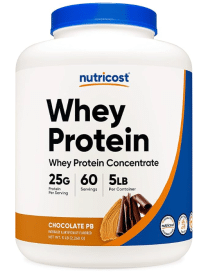Protein Myths too Many People Believe are True
Protein, being the favorite macronutrient for most bodybuilders, gets a lot of attention from people who quite honestly do not entirely understand the fitness lifestyle. There are a lot of rumors about our beloved protein that really are not true, such as it causing unwanted side effects, it hurts your organs, and so on. These are protein myths, which might leave some people confused about if, as well as how much of this specific macro they should include it in their diets.
In this post, our team here at Generation Iron cover the five protein myths most people believe are true and explain what really are the most important factors for protein consumption.
What is Protein?

Protein is a macronutrient often found in foods such as meat. To break it down even further, protein is a molecule made up of amino acids, and is found all throughout the body; it is in the muscle, bone, skin, hair, and virtually every other body part or tissue. It makes up the enzymes that power many chemical reactions in your body and the hemoglobin in your blood that carries oxygen.
It is the building block of your muscles. When you train, your muscles are being broken down and in order to repair, you need protein. It helps the body’s cells recover and grow, which is why it is so essential for gym goers.
To set the record straight and put it simply, protein is an essential macronutrient and you can’t cut it out of your diet. If you’re one of those people who is wondering if they should jump on the protein bandwagon, you’ve come to the right place.
Consuming Protein Can Damage the Kidneys
This is one of the most common myths around protein, and it really is a turn off for someone who does not know much about the topic. Consuming protein cannot damage your kidneys if you do not already have an underlying kidney or liver disease.
With that being said, an excess of just about everything is bad. Diversify your protein intake between animal and plant sources. If you’re on a high protein diet, you might want to increase your calcium intake as some research suggests it is possible that excess protein intake causes you to dispose of more calcium through urination, which can affect your bone health.
Protein Only Helps with Muscle Development
We all remember that old Taco Bell commercial featuring Kali Muscle and Mike O’Hearn where they are on the beach drinking protein shakes and discussing how much they love protein. That is honestly what a lot of people associate protein with, bodybuilding and gigantic muscular men. Many people flat out dismiss protein-rich foods considering them to be strictly bodybuilding food.
However, protein is not just for bodybuilders, it is one of the three essential macronutrients (the other two being fat and carbs) and it cannot be left out of your diet. It helps in supporting a healthy immune system and can regulate blood glucose. Not to mention, a higher protein diet can also aide in the fat loss process.
As stated above, protein is composed of amino acids which are not only a component of muscle, but also of:
- Bones
- Joints
- Tendons and ligaments
- Hair
- Antibodies
- Hormones
- Enzymes
- LDL and HDL cholesterol
You Can’t Meet Your Protein Requirements on a Plant-Based Diet

A vegan diet and lifestyle have met a lot of resistance based on the myth that you can’t meet your daily protein requirement on a plant-based diet. If you’re a vegan, you might have to include a plant-based protein supplement to help you achieve your daily goal. Plant-based protein supplements also can be helpful for people with a more sensitive stomach.
You can meet your protein requirement on a plant-based diet, but you would need a well-optimized diet plan as most plant foods do not contain the same quantity of protein and essential amino acids as animal products like beef and chicken.
Everyone Should Take a Protein Supplement

Throughout the ages, protein has mostly been associated with bodybuilders and the fitness community, especially the usage of products such as protein powders or protein bars. It has since been thought that you can’t build muscle mass without the use of a protein supplement, and this is about as far away from the truth as it can be.
To build muscle, you should be consuming roughly 1 gram to 1.5 grams of protein for every pound of body weight. This goal can be met by consuming whole foods, such as chicken, beef, eggs, and fish throughout the day.
If you’re not into bodybuilding or training, your daily recommended protein goal typically is 0.4 grams of protein per pound of bodyweight which can be met without even trying.
It Doesn’t Matter How or When You Consume Protein

Some people think if you’re having enough amounts of protein, the time of consumption and quality of the protein doesn’t matter. To get optimal results, you need to spread out your protein consumption equally throughout the day, taking it in all at once is useless, as your body can only absorb so much at a time. It is thought that the most amount of protein you can take in at one time is between 25 and 35 grams.
The source of the protein also plays a major role in the effects they have on the body. Just like us humans, not all proteins are created equal. The protein you get out of chicken is superior to the protein in a chicken burger patty. Different supplement brands also use the protein of different qualities. You should do your research before settling on a supplement or designing a diet.
A Protein Powder We Recommend
We can’t just throw all of this information at you without providing you with a product we stand behind! If you are interested in consuming a protein powder, we have one for you.
Nutricost Whey Protein
Looking for a cheap whey protein concentrate? Check out Nutricost Whey Protein Concentrate! A quality protein supplement at half the cost.
Nutricost Whey Protein Concentrate stands out for its simplicity and transparency. Made primarily from whey protein concentrate—known for preserving more of the beneficial nutrients than whey isolate—it offers a more complete protein source for those seeking balanced nutrition. With no artificial flavors, sweeteners, or colors, it’s a clean, no-frills option for anyone who prefers a straightforward supplement. However, those who enjoy a wide range of sweetened flavors may find the taste options more limited.
Protein Myths Wrap Up
Overall, there are plenty of myths surrounding protein. The fact is, it is an essential macro and has so many benefits that are hard to ignore.
Will you be consuming more protein? How much protein do you consume in a day? Let us know in the comments below. Also, be sure to follow Generation Iron on Facebook and Twitter.
*Header image courtesy of Envato Elements.









